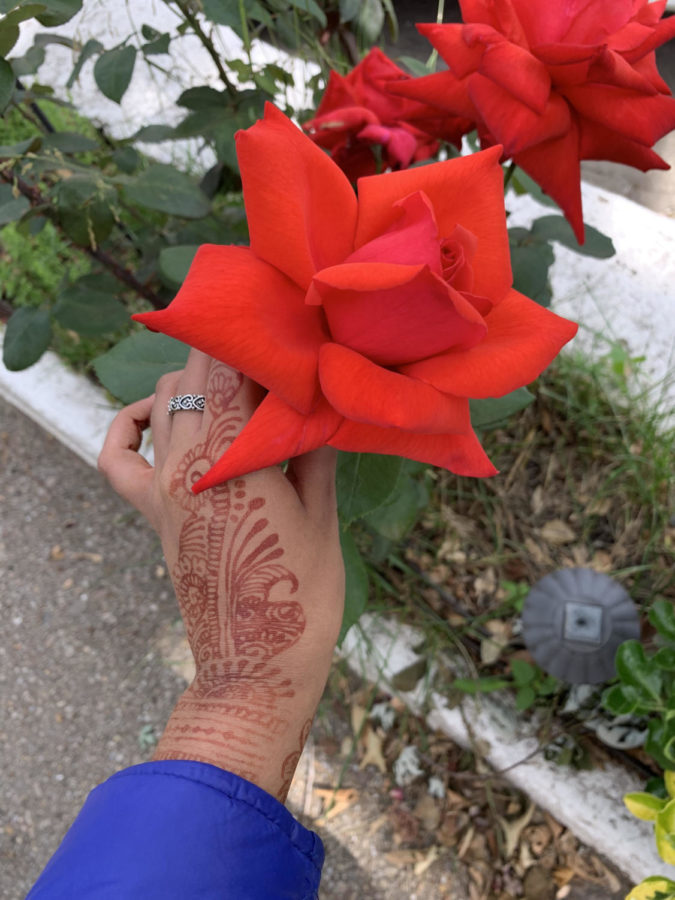The Art of Romanticizing
Can romanticism help us get back into a healthy mindset? Or should we look for other options?
I took a stroll through my neighborhood and saw some really pretty flowers. Looking at the beautiful gardens here helps me to relax and destress.
To romanticize or to not romanticize, that is the question that many Bronx Science students seem to be asking. But first, we need to know what ‘romanticizing’ is.
Romanticism is generally characterized by its emphasis on emotion and individualism, allowing people to express themselves in a more freeing manner but also causing them to be on the more optimistic side of things. Josephine Kinlan ’22 describes it as “wearing rose-colored glasses when walking around and seeing beauty on every corner.” She added that “there really is so much beauty if you think about it: culture, music, art, nature, people, food, and more.” Romanticism causes people to actively try to see the world around them in a better light in an effort to lead a happier lifestyle.
The ideas behind Romanticism influence individuals to try and gain a healthier, more positive outlook on life. Kinlan said, “I think that the act of romanticizing can absolutely help people have more motivation and a larger sense of fulfillment because it kind of removes the focus on the individual — which is everywhere in a capitalist, individualist society and country, inevitably — and teaches people to value things for what they are — not what they are necessarily supposed to be. It erases that monetary or superficial value and introduces this new thinking process of acceptance as things are, and then allows one to search for what one can appreciate about certain things. it increases gratitude, curiosity, and motivation towards education and context.”
As Kinlan noted, acceptance, motivation, and fulfillment, are all an active part and a benefit of the romanticism lifestyle. For our generation, finding acceptance from within ourselves is becoming increasingly difficult. Many of us rely on external outlets to give ourselves a sense of self worth, social media being the most prevalent of them all. “Likes” on Instagram or Facebook, for example, cause many teens to feel that they aren’t good enough if the number of likes they receive isn’t comparable to the ones their fellow classmates or friends may receive. Through romanticization of self, Arianne Browne ’22 was able to build up a positive relationship with herself and come to love herself in the way that helped her mindset.
Browne said, “I spent a long time feeling very disconnected from myself and my own emotions. It was almost as if I was living on autopilot and doing what anyone else in my life expected of me. But, now, I take great joy in getting to know myself better — my favorite foods to eat, flowers I love, places that make me happy, enjoying all the qualities I have (whether positive or negative). This is just one relationship that means so much to me because I’m truly the only person I have to live with for the rest of my life, and I’d like to build a happy relationship with myself.”
When asked about how romanticism helped her to grow, she spoke about how she used to feel like a burden even when there was no reason to feel that way. She elaborated saying that she felt as if she “had a negative impact in their lives” and started closing herself off from people. Once she started practicing the romanticization mindset, she started seeing herself in a more positive light, and was able to make better and stronger connections with the people around her, bringing more joy into her life.
There are a variety of different things that you can romanticize daily which can have different levels of impact for you. Many students seem to agree that the act of taking long, relaxing walks or watching nature can help you get into a healthy mindset and allow you to take the first steps towards romanticization.

Andy Chan’22 said, “One thing that I enjoy romanticizing is staring out of my window during the morning and right before sunset. Admiring and listening to the sounds of nature helps me stay happy and relaxed. I believe that it is important to take breaks from your electronics, especially in the age that we live in. My best ideas come from sitting in a cafe and enjoying a nice cup of coffee. When you romanticize your life, you are giving time for yourself to reflect and analyze your life to make it better!” Being able to reflect on your life is very important to your own personal development and how you approach problems. Through romanticization, reflection and acceptance become a daily habit.
“You have to accept whatever comes and the only important thing is that you meet it with courage and with the best that you have to give,” said Eleanor Roosevelt.
A lot of people can’t accept themselves for who they are. Many of them feel that they need to constantly provide something to someone in order to matter. They work themselves tirelessly in an effort to prove themselves to people, suffering for a small piece of approval, all because it makes them feel validated. This is a major problem. Our self-worth should not be coming from another person. It should stem from within ourselves. We should be able to understand that to be human means to have faults and to have problems and to not be the best at everything we lay our hands on. This shouldn’t mean that we should just see our problems and say that people are required to put up with them. Problems are still problems, but they shouldn’t be worked on in a way that is detrimental to your health, physically or mentally. The romanticization mindset promotes positive thinking towards oneself and one’s life. It helps people take a step back and think about what is going on in their life and how they can change aspects to better suit their needs.

Romanticism does not mean that you have to beautify external objects, it can also mean to try to beautify your internal thoughts. It gives people the push people need to get through times of hardship and confusion by giving them something to focus on. Eric Yang ’22 said, “I really like the idea of pushing myself to the limit. I think about how much tougher I would be both physically and mentally if I summoned the will power to go 100%. I think about how awesome I would feel knowing I have the power to overcome both doubt and fatigue. This thought empowers me and gives me a rush of excitement. This mindset impacts my life in a positive way because it makes me more proactive towards doing things that will benefit me. It holds me accountable for getting things done even though I may not be feeling my best. With this said, I recommend people entertain the idea of discomfort equating to growth. I think romanticizing can help people temporarily push through times of hardship and laziness.” According to the Mental Health Foundation, mindfulness can help you understand your emotions better, cope better with difficult thoughts, feel calmer, boost your attention and concentration as well as improve your relationships to name a few. All of these things (and more) are achievable through the Romanticism mindset.
When fellow Bronx Science students who practice romanticism were asked about how we can start the Romanticism mindset, many of them said that taking long walks, reading, writing journals, and actively correcting negative thoughts in your daily life can help immensely. Chanel Richardson‘22 offers a great insight from her own personal experience. “I think just be aware of your feelings and actions and try to take all the small things that you normally wouldn’t. You know, really listening to every instrument in a song, staring out the window when you’re above ground on the train and admiring all the life the city has. Even if you’re walking through a park making sure you feel the wind pass through you and you see the trees shake and just acknowledging that you are here, and living right now.” The act of simply acknowledging that you are trying, and that you matter regardless of the end result can really help you grow positively.
While romanticism is a great mindset to follow, there are some possible cons to look out for. For example, sometimes when people are so focused on “being in the moment” they end up losing the moment because they weren’t wholly present. Another example is given by Angelena Bougiamas ’22 who said, “I think romanticism can become a problem, however, if people equate a romanticized life to one that is not their own or one of someone who they perceive to be in a ‘better’ position than them. This would lead to constant comparisons to these people, and the purpose and joy of deriving your own meaning from your life is completely lost in the pursuit to live like how you perceive someone else lives. Therefore, what makes romanticism effective for me is finding my own personal meaning and reasons for why I find something beautiful or enjoyable.” Comparisons with other people can be extremely detrimental to one’s personal health. To be in the position where you are constantly questioning whether or not you are doing enough can and will cause you a lot of fatigue and stress. It is important that when exercising the Romantic mindset, you are able to firmly grasp onto the acceptance and understanding portion of it. Until you are able to see yourself for who you are, such comparisons can impact you negatively for a long period of time. As Bougiamas said, it’s beneficial to find your own personal meanings and thoughts without the influence of others.
Overall, Romanticism is extremely beneficial to enhance one’s day to day life without doing anything particularly extraordinary. The act of positive thinking and actively trying to enjoy life can have a major positive difference in the happiness a person can achieve doing mundane, everyday activities. Even the most monotonous of tasks can become fun when you look for reasons to enjoy them.
“I spent a long time feeling very disconnected from myself and my own emotions. It was almost as if I was living on autopilot and doing what anyone else in my life expected of me. But, now, I take great joy in getting to know myself better — my favorite foods to eat, flowers I love, places that make me happy, enjoying all the qualities I have (whether positive or negative). This is just one relationship that means so much to me because I’m truly the only person I have to live with for the rest of my life, and I’d like to build a happy relationship with myself,” said Arianne Browne ’22.
Zhian Maysoon is a Chief Graphic Designer and the Editor-in-Chief of the Bronx Science yearbook, ‘The Observatory’, as well as a Staff Reporter for...

